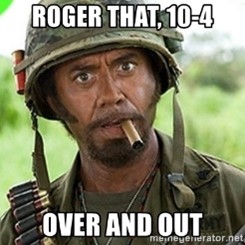Are you a ham radio operator? Do you know how the effectively communicate using your radio? When you’re ready to end your conversation, do it the right way by saying “over and out” before signing off. This post unpacks the meaning and origin of this expression.
Meaning
The saying “over and out” is a standard part of radio communications between truck drivers, military operators, and Ham radio enthusiasts. At the end of your conversation, you'll use it to let the other party or parties know that you are signing off.
Don’t confuse the saying with “over,” as this word means that you’re handing over the conversation to the other party. Signing off after saying over would be rude, indicating that you don’t want to hear what other people have to say.
If you sign off without saying “over and out,” the other person may try to raise you on the radio again to see if anything bad happened, causing you to drop communications. Over and out is an internationally-accepted way of ending radio communications with others.
Example Usage
“I understand the route. Thanks for the information. I’ll watch out for the enemy on the route. Ok, 10-4 good buddy, over and out.”
“We’re approaching the landing area now. We can see the flares on the landing field. We’re starting the landing procedure, and we’ll be in touch after arrival. Over and out.”
“The I-95 is all choked up, and we’re going to have to take an alternative route. We’ll see you at the depot in a few hours. Over and out.”
“Alright, team, we’re three clicks from the target. It’s time to maintain radio silence. Everyone stays quiet. Over and out.”
“Check, we see the enemy coming over the horizon. We have our orders, and we’re ready to engage. Over and out.”
“We’re approaching the marina now. We’ll be there in ten minutes. See you at the dock. Over and out.”


Origin
The expression “over and out” originates from the invention of the radio in the 1800s. People who would communicate via radio would often talk over each other when they thought the other person had finished what they had to say.
So, to clear the confusion, people started saying “over” at the end of their piece to let the other person know they could chime in with their thoughts. When the person wanted to end the conversation, they would say “over and out.”
The phrase became popular for military communications and eventually Ham radio operators, like truck drivers. It’s still used today and is crucial for effective radio communications.
Phrases Similar to Over and Out
- 10-4 over and out.
- Cease communications.
- Hang up.
Phrases Opposite to Over and Out
- Let’s keep the conversation going.
What is the Correct Saying?
- Over and out.
- 10-4 over and out.
Ways People May Say Over and Out Incorrectly
“Over and out” is a part of official radio and telecommunications. Using it to describe the action of jumping over something and coming out of a tight spot would be incorrect.
Over and out is the end of the conversation, and when operators finish talking, they say “Over” to let the other person know it's their time to speak. Using “over and out” instead of over is wrong, and it means that you want to end the conversation.
Acceptable Ways to Phrase Over and Out
You can use the phrase “over and out” during radio communications and as a comical way to end conversations with friends. Ham radio operators, military personnel, and law enforcement use “over and out” as a way to say they are cutting communications for now after receiving information or instructions.
You can use the phrase with your friends when ending a phone call as a way to bring a smile to people's faces. Or you can use it when you’re communicating with the coast guard, law enforcement, or any other official radio communications.